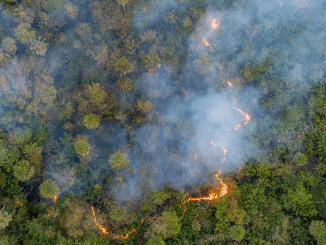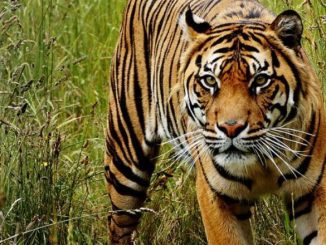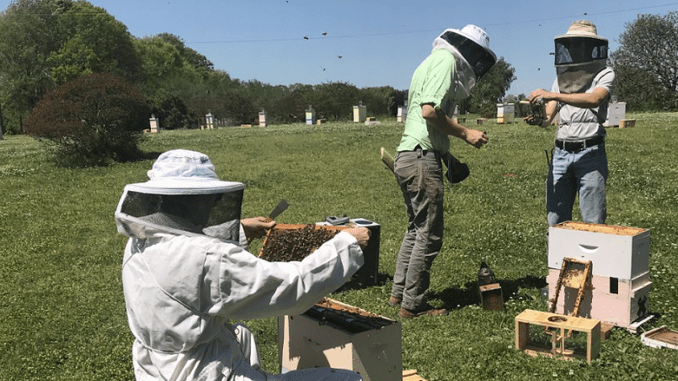
WASHINGTON, DC, January 11, 2023 (ENS) – The first vaccine for the world’s imperiled honeybees has been approved by the U.S. Department of Agriculture for two years on a conditional basis. The vaccine was developed by Dalan Animal Health, Inc., a biotech company based at the University of Georgia’s Innovation Hub in Athens, Georgia.
The vaccine is intended to help honeybees resist American foulbrood, a destructive disease that can wipe out entire bee colonies. The USDA calls American foulbrood “one of the most widespread and the most destructive of the honey bee brood diseases.”
The new vaccine works by cutting off foulbrood spores at the source.
Caused by Paenibacillus larvae, American foulbrood spreads through spores and kills bees when they are still in a pupal stage, eliminating the bee larvae. Bee larvae are the stage between egg and pupa in the development cycle, and no bee colony can be healthy without lots of larvae.
Once a colony is established, the queen must lay eggs directly into honeycomb cells that host the eggs for a short period before they become bee larvae. The worker bees must feed bee larvae directly since the white larvae are blind, legless, and unable to feed themselves.
The vaccine contains killed whole-cell Paenibacillus larvae bacteria. It is administered by mixing it into queen feed which is consumed by worker bees. The vaccine is incorporated into the royal jelly by the worker bees, who then feed it to the queen. She ingests it, and fragments of the vaccine are deposited in her ovaries. Having been exposed to the vaccine, the developing honeybee larvae have immunity to foulbrood as they hatch.
Dalan Animal Health intends to use this approach to develop vaccines for other honeybee diseases and for underserved industries, such as shrimp, mealworms, and insects used in agriculture.
The vaccine comes from a partnership between Dalan Animal Health and the University of Georgia’s College of Agricultural and Environmental Sciences.
“People don’t understand how hard it is to keep bees alive,” Keith Delaplane, professor of entomology and director of the UGA Bee Program, said in a statement. “I can’t imagine a more frightening branch of agriculture to be in. It takes ceaseless attention.”
Honeybees are a critical component of agriculture. One-third of the global food supply relies on pollination, and healthy commercial hives are essential to secure high crop yields. However, honeybees are plagued by American Foulbrood, with previously no safe and sustainable solution for disease prevention.
Overt clinical cases of American foulbrood are notifiable in the United States and Canada, and the only treatment method available before this vaccine relies on the incineration of bees and infected hives and equipment.
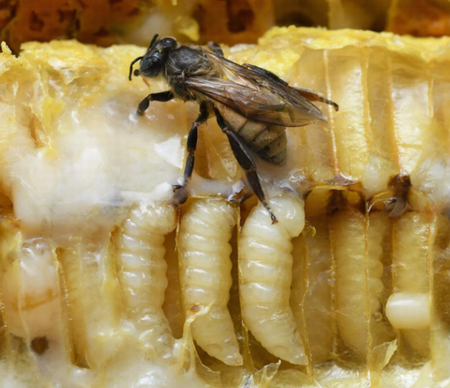
The USDA’s Agriculture Research Service explains how the disease spreads. “The spores are fed to young larvae by the nurse bees. They then germinate in the gut of the larva and multiply rapidly, causing the larva to die soon after it has been sealed in its cell. By the time of death of the larva, the new spores have formed. When the house bees clean out the cell containing the dead larva, these spores are distributed throughout the hive and more and more larvae become infected. The honey in an infected colony can become contaminated with spores and can be a source of infection for any bee that gains access to it.”
“For example, as a colony becomes weak, it cannot defend itself from attacks by robber bees from strong nearby colonies; these robbers take back the contaminated honey to their own colony, continuing the cycle of infection,” the USDA explains. “The beekeeper also may inadvertently spread the disease by exposing contaminated honey to other bees or by the interchange of infected equipment. Moreover, drifting bees or swarms issuing from an infected colony may spread the disease.”
Efficacy studies have indicated that oral vaccination of honeybees may reduce larval death associated with American foulbrood infections caused by P. larvae.
The vaccine is non-GMO and can be used in organic agriculture, Dalan Animal Health said.
Pollinators such as bees are responsible for one of every three bites of food humans eat, according to the USDA, but pollinator numbers have been declining for years. In fact, U.S. beekeepers lost 39 percent of their honeybees in the year from April 2021 through April 2022, according to a survey by the Bee Informed Partnership.
The Partnership gathers survey data from thousands of beekeepers every year and collects more than 10,000 field samples each season to understand how different management practices, forage, pests, diseases, nutrition and other environmental factors affect honeybee health.
Bee decline has many causes such as less crop diversity, climate change, air pollution, habitat loss, and ineffective beekeeping practices. Pesticides destroy bees’ immune systems and can kill the bees. Varroa mites weaken them and can cause the collapse of whole colonies.
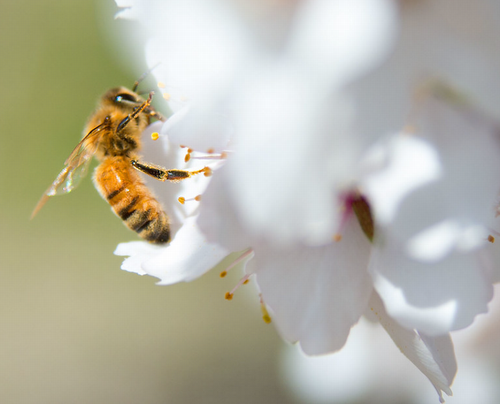
So, beekeepers are welcoming the conditional approval of the first honeybee vaccine with hope.
“This is an exciting step forward for beekeepers, as we rely on antibiotic treatment that has limited effectiveness and requires lots of time and energy to apply to our hives,” Trevor Tauzer, a board member of the California State Beekeepers Association and owner of Tauzer Apiaries, which provides pollination services to growers.
“If we can prevent an infection in our hives, we can avoid costly treatments and focus our energy on other important elements of keeping our bees healthy,” Tauzer told reporters.
“We are committed to providing innovative solutions to protect our pollinators and promote sustainable agriculture. Global population growth and changing climates will increase the importance of honeybee pollination to secure our food supply. Our vaccine is a breakthrough in protecting honeybees. We are ready to change how we care for insects, impacting food production on a global scale,” said Dr. Annette Kleiser, CEO of Dalan Animal Health.
The bacterin was developed by Dalan Animal Health, and is manufactured by Diamond Animal Health of Des Moines, Iowa, a wholly-owned subsidiary of the Colorado company Heska, which in turn is owned by IDEXX Livestock and Poultry based in Maine.
“We are grateful for the help and assistance that Diamond has been able to offer – not just in manufacturing development, but also regulatory expertise,” said Dr. Kleiser.
The USDA has issued the vaccine a conditional license for two years. Dalan will distribute the vaccine on a limited basis to commercial beekeepers and anticipates having the vaccine available for purchase in the United States this year.
Featured image: Researchers from the University of Georgia Bee Lab study hives. (Photo by Keith Delaplane courtesy University of Georgia College of Agricultural and Environmental Sciences)
© 2023, Environment News Service. All rights reserved. Content may be quoted only with proper attribution and a direct link to the original article. Full reproduction is prohibited.


